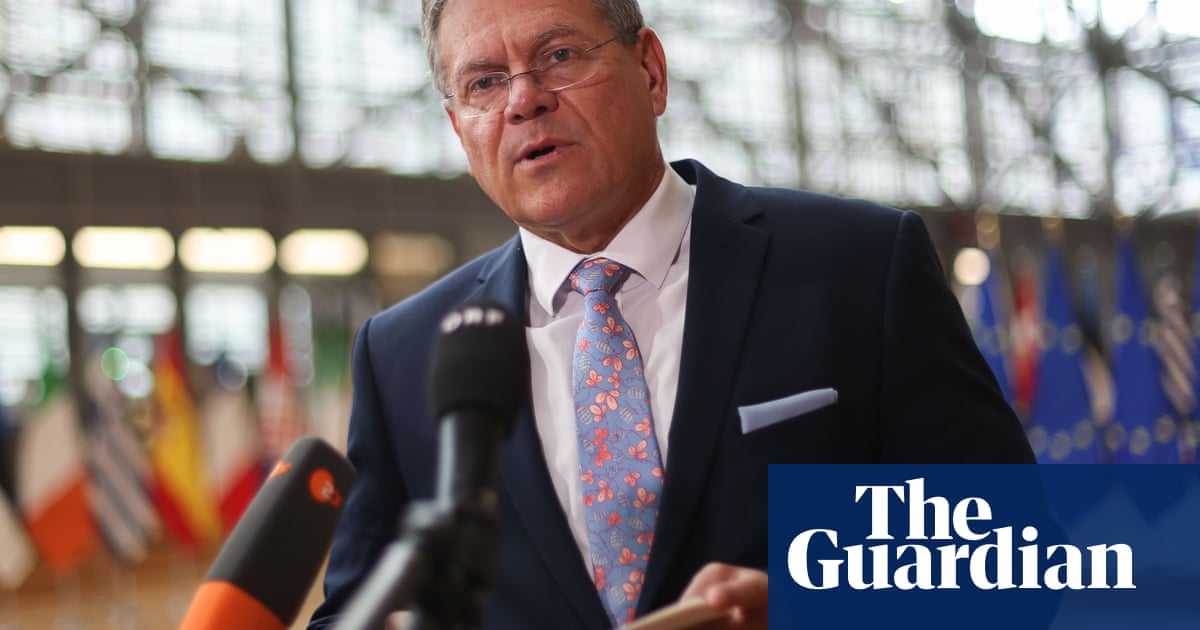Judge blocks Trump from dismantling the Consumer Financial Protection Bureau
A US judge has just issued a ruling blocking the Trump administration from dismantling the Consumer Financial Protection Bureau (CFPB), a vital watchdog agency, the AP reports.
The US district judge Amy Berman Jackson’s ruling puts in place a preliminary injunction that maintains the agency’s existence while she considers the arguments of a lawsuit seeking to prevent the president’s decimation of the bureau. The judge said the court “can and must act” to save the CFPB from being shuttered, according to the AP.
The CFPB had been targeted for mass terminations, and employees were ordered to stop working last month after Donald Trump fired the bureau’s director. The current chief operating officer has said the agency was in “wind-down mode”. The president’s attacks on the bureau, which included canceling $100m in contracts and ordering immediate suspension of CFPB operations, have caused chaos, workers have testified.
The consumer watchdog is a popular US agency known for recovering more than $21bn for defrauded Americans. It was created after the 2008 financial crisis.
The judge on Friday ordered the CFPB to maintain a hotline for consumer complaints and provide office space for its employees or allow them to work remotely, according to Reuters.
Key events
Doge can continue cuts at US Agency for International Development, appeals court rules
A US appeals court has lifted an order blocking Elon Musk’s unofficial “department of government efficiency” (Doge) from making additional cuts at the US Agency for International Development (USAID).
The ruling comes in a lawsuit filed by former USAID employees against Musk, alleging Doge’s actions were unconstitutional given that Musk was not in a Senate-approved position or elected to office, the AP reports. A judge in a lower court ruled against Musk, finding Doge’s efforts to dismantle USAID were likely unconstitutional, but the fourth US circuit court of appeals disagreed, finding that while Doge played a role, the cuts were approved by government officials.
Musk had posted on social media that he “fed USAID into the wood chipper”, but the appeals court said that comment wasn’t legal proof that he was making the orders.
“While defendants’ role and actions related to USAID are not conventional, unconventional does not necessarily equal unconstitutional,” wrote Marvin Quattlebaum, a circuit judge appointed by Trump.
The lower court ruling by the US district judge Theodore Chuang in Maryland had ordered the Trump administration to restore computer access to USAID employees, but did not reverse firings.
An Iranian doctoral student who was detained by US immigration authorities this week amid the Trump administration’s escalating crackdown on campuses had no involvement in protests, his lawyer said.
Alireza Doroudi, a 32-year-old University of Alabama student, was arrested at his apartment in the middle of the night earlier this week, according to his attorneys. His visa had been revoked in 2023, but he was authorized to stay in the US while he remained a student, David Rozas, his lawyer, told the AP. Rozas said:
He has not been arrested for any crime, nor has he participated in any anti-government protests. He is legally present in the US, pursuing his American dream by working towards his doctorate in mechanical engineering.
The Department of Homeland Security claimed Doroudi “posed significant national security concerns”, according to the AP, but declined to elaborate. Doroudi’s lawyer said he was unaware of any specific security allegations against his client.
A string of students on visas and permanent residents with green cards have been arrested and threatened with deportation in recent days, many of them with some ties to pro-Palestinian activism. Rumeysa Ozturk, a doctoral student at Tufts University in Boston, who was detained by plainclothes officers in masks, had co-written an op-ed about the university’s response to the war in Gaza.
Here’s our earlier coverage of Doroudi’s case and the reaction at the University of Alabama:
Wisconsin attorney general seeks to block Elon Musk’s $1m check giveaways
The Democratic attorney general of Wisconsin has asked a court to block Elon Musk from giving $1m checks to voters as he seeks to influence a critical state supreme court race, the AP reports.
Musk, who has been railing against judges blocking Trump administration policies, initially said in a social media post that he planned to “personally hand over” $2m to a pair of voters who had cast ballots in the race. He later claimed the money would go to people who will be “spokesmen” for an online petition targeting “activist” judges.
On Friday, Musk’s political action committee identified the recipient of the first $1m giveaway – a man who had donated to the conservative candidate in the court race and who has posted in support of Trump, the AP said.
The race will determine the ideological tilt of the court, which is expected to consider abortion rights, union cases, congressional redistricting and voting rules.
Josh Kaul, the state’s attorney general, urged a court to prevent Musk from making future payments to Wisconsin voters and to cease promoting a giveaway event this week. He argued the payments violated state law. Musk has deleted his post promising a giveaway, and a spokesperson for his Pac declined to comment to AP.
Judge blocks Trump from dismantling the Consumer Financial Protection Bureau
A US judge has just issued a ruling blocking the Trump administration from dismantling the Consumer Financial Protection Bureau (CFPB), a vital watchdog agency, the AP reports.
The US district judge Amy Berman Jackson’s ruling puts in place a preliminary injunction that maintains the agency’s existence while she considers the arguments of a lawsuit seeking to prevent the president’s decimation of the bureau. The judge said the court “can and must act” to save the CFPB from being shuttered, according to the AP.
The CFPB had been targeted for mass terminations, and employees were ordered to stop working last month after Donald Trump fired the bureau’s director. The current chief operating officer has said the agency was in “wind-down mode”. The president’s attacks on the bureau, which included canceling $100m in contracts and ordering immediate suspension of CFPB operations, have caused chaos, workers have testified.
The consumer watchdog is a popular US agency known for recovering more than $21bn for defrauded Americans. It was created after the 2008 financial crisis.
The judge on Friday ordered the CFPB to maintain a hotline for consumer complaints and provide office space for its employees or allow them to work remotely, according to Reuters.
US judge blocks Trump’s fast-tracked deportations
A US judge has issued an order blocking the Trump administration from swiftly deporting people to countries with which they have no relationship, Reuters reports.
The ruling from the US district judge Brian Murphy in Boston is a nationwide temporary restraining order, stipulating that immigrants threatened with deportation to a third country must have a chance to raise claims that they would face persecution or torture if they were deported. The order is designed to “protect migrants subject to final orders of removal from being swiftly deported to countries other than those that had already been identified during immigration proceedings”, Reuters said.
The ruling came in a lawsuit filed by immigrant rights advocates challenging an 18 February directive that instructed officers to review cases of individuals previously released from detention, and to consider re-arresting and deporting them to third countries. The judge told a US justice department attorney at a hearing:
If your position today is that we don’t have to give them any notice, and we can send them to any country other than the country to which the immigration court has said no, that’s a very surprising thing to hear the government say.
Trina Realmuto, a lawyer for the immigrants at the National Immigration Litigation Alliance, praised the ruling, saying: “We’re relieved the judge saw the urgency of this situation both for our named plaintiffs and other similarly situated individuals.”
The order comes as the Trump administration continues to face widespread scrutiny over its rushed deportations of Venezuelans to El Salvador.
Mahmoud Khalil’s lawyers call for his release and criticize ‘Kafkaesque’ treatment
Attorneys for Mahmoud Khalil, the Columbia University activist facing deportation due to his involvement in pro-Palestinian demonstrations, urged a US judge on Friday to free their client, a green-card holder.
Khalil was detained earlier this month in New York and transferred to immigration detention in Louisiana, even though he is a permanent resident and has not been accused of a crime.
According to the AP, Baher Azmy, one of Khalil’s attorneys, argued in court that the case should be moved back to New York, saying: “They keep passing around the body in an almost Kafkaesque way.” The attorney argued that the US was chilling Khalil’s free speech: “The longer we wait, the more chill there is … Everyone knows about this case and is wondering if they’re going to get picked off the street for opposing US foreign policy.”
The attorneys and the US justice department were appearing in court in New Jersey to debate which court should have jurisdiction over the case as Khalil fights to be released. The US district judge Michael Farbiarz said he would issue a written decision.
Khalil recently spoke out from detention, saying in a statement shared with the Guardian: “I am a political prisoner.” More background on Khalil here:
Trump administration investigating Maine over trans rights policies
The US Department of Education said Friday it had launched an investigation into Maine over school districts’ trans rights policies.
The Trump administration has accused some Maine school districts of “prohibiting parents from accessing records relating to their child’s ‘gender transition’”, claiming this violates federal laws protecting parents’ rights.
Some school districts in Maine and across the country have adopted policies meant to protect the privacy of LGBTQ+ students who may be out at school, but not at home where it could be unsafe or they may be unsupported by parents. Some policies are meant to stop the “forced outing” of students to their families.
The US education department said in a statement it had received reports alleging that some Maine districts have policies that allow schools to “create ‘gender plans’ supporting a student’s ‘transgender identity’”, but then withhold those records from parents, according to the AP. Maine school officials declined to comment to the AP.
The investigation, along with a similar one announced targeting California schools, is part of the Trump administration’s aggressive attack on trans youth rights.
During his campaign last year, Trump repeatedly spread misinformation and falsehoods suggesting students were getting gender-affirming medical care and surgeries in school without parents’ involvement. The LGBTQ+ rights policies in question, however, generally involve respecting trans students’ pronouns and names and allowing them to use facilities that match their gender.
US consular offices ordered to vet student visas for ‘terrorist activity’
The US state department has ordered consular officers to conduct expanded screening processes for student visa applicants, including through comprehensive social media investigations, the Guardian’s Joseph Gedeon reports.
A 25 March cable describes a new standard for visa denials based on a broad definition of what constitutes support for “terrorist activity”. The directive states that “evidence that an applicant advocates for terrorist activity, or otherwise demonstrates a degree of public approval or public advocacy for terrorist activity or a terrorist organization” can be grounds for visa rejection.
It specifically targets new and renewing F, M and J student visa applications, providing explicit instructions for consular officers to conduct mandatory social media reviews digging into applicants’ lives online. Officers are directed to examine the social media of all students applying for a visa for evidence of activities the administration defines as a threat to national security or terrorism.
The move comes as the Trump administration has been aggressively targeting students on college campuses across the country deemed to have ties to pro-Palestinian activism. This week, Rumeysa Ozturk, a Turkish Fulbright scholar at Tufts University in Boston, was detained by agents, who were wearing plainclothes and masks, an arrest caught on video that sparked widespread outrage. She had a student visa and had co-written an op-ed last year supporting calls for the university to “acknowledge the Palestinian genocide”.
More here:
Defense secretary Pete Hegseth’s younger brother is serving in a key position inside the Pentagon as a Department of Homeland Security liaison and senior adviser, Hegseth’s office confirmed.
The high-profile job has meant meetings with a UFC fighting champion, a trip to Guantánamo Bay and, right now, traveling on the Pentagon’s 747 aircraft as Hegseth makes his first trip as defense secretary to the Indo-Pacific.
Phil Hegseth’s official title is senior adviser to the secretary for the Department of Homeland Security and liaison officer to the defense department, spokesperson Kingsley Wilson said in a statement Thursday.
“Phil Hegseth, one of a number of talented DHS liaisons to DOD, is conducting touch points with US Coast Guard officials on the Secretary’s Indo-Pacific trip,” which includes stops in Hawaii, Guam, the Philippines and Japan, Wilson said in response to a query by the Associated Press.
It’s common for the defense department and other federal agencies to have liaisons. Each military branch sends liaisons to Capitol Hill. The Pentagon, state department and others all use interagency liaisons to more closely coordinate and keep tabs on policy.
But it is not common for those senior-level positions to be filled by family members of the cabinet heads, said Michael Fallings, a managing partner at Tully Rinckey PLLC, which specializes in federal employment law.
It’s not the first time Phil Hegseth has worked alongside his older brother. When Pete Hegseth was CEO of Concerned Veterans for America, a non-profit that fell into financial difficulty during his time there, he paid his brother $108,000 to do media relations for the organization, according to federal tax records.
In a statement, the Department of Homeland Security confirmed Phil Hegseth’s job title and said this “interagency mission is part of Mr Hegseth’s preview”, presumably meaning “purview”.
DHS said Phil Hegseth, while on the Indo-Pacific trip, has been meeting with representatives from Homeland Security Investigations, the law enforcement arm of the department, “and other DHS components and interagency partners”.
The Pentagon did not respond to a request to interview Phil Hegseth. Neither the Pentagon nor the Department of Homeland Security has responded to queries about his qualifications for the job.
Federal judge extends block on Trump use of wartime law for deportations
A US federal judge on Friday extended his temporary halt to Donald Trump’s use of a 200-year-old wartime law to deport alleged Venezuelan gang members to El Salvador, dealing a setback to the president’s push to speed up the deportations.
Reuters reports that US district judge James Boasberg’s temporary restraining order will put Trump’s use of the 1798 Alien Enemies Act on hold until 12 April while litigation plays out. Boasberg issued a two-week freeze on the use of the law during an emergency 15 March hearing after Trump invoked the act.
The American Civil Liberties Union challenged Trump’s use of the act to rapidly deport alleged members of the Tren de Aragua gang to El Salvador. The ACLU argues the law denies the immigrants due process to contest allegations of gang membership.
The US circuit court of appeals for the DC circuit on Wednesday upheld Boasberg’s initial pause on Trump’s use of the law, with a Trump-appointed judge dissenting in a 2-1 decision.
The Trump administration on Friday asked the supreme court to lift Boasberg’s halt on the deportations.
Related: White House asks supreme court to allow deportations under wartime law
US needs control over Greenland and ‘can’t do without it’, Trump says

Jakub Krupa
Donald Trump has just repeated that the US needs control over Greenland for “world peace”, adding that he hopes Denmark and the EU would understand and saying “if they don’t, we are going to have to explain it to them”.
“Do you think we can do without it? We can’t,” he said.
“We need Greenland. Very importantly, for international security, we have to have Greenland.
“If you look at Greenland right now, if you look at the waterways, you have Chinese and Russian ships all over the place, and we’re not going to be able to do that.
“We’re not relying on Denmark or anybody else to take care of that situation.
“And we’re not talking about peace for the United States. We’re talking about world peace. We’re talking about international security.”
He said that “modern-day weaponry makes Greenland” more important than it was 100 years ago, particularly with new “water roadways” opening up.
“Greenland’s very important for the peace of the world, not us, the peace of the entire world, and I think Denmark understands it, I think the European Union understands it.
“And if they don’t, we’re going to have to explain it to them.”
Trump spoke on the sidelines of the swearing-in ceremony for the US attorney for New Jersey – just minutes before his vice-president, JD Vance, is due to speak from Greenland.
You can follow his speech here:
‘Essentially a settlement’: law firm Skadden strikes deal with Trump administration to avert an executive order
Donald Trump announced that the law firm Skadden, Arps, Slate, Meagher & Flom has agreed to provide at least $100m in pro bono legal services to the federal government during this administration.
It is the latest example of legal firms caving in to pressure from the Trump administration, and appears to be the first instance where a firm has pre-emptively struck a deal to avoid Trump’s executive orders targeting law firms and attorneys who challenge his priorities, per the New York Times (paywall). It was unclear why Skadden drew Trump’s ire but Elon Musk has criticised the firm over its work in a lawsuit against a rightwing media critic, Dinesh D’Souza, according to the Times.
Announcing the deal on Friday, Trump said:
This was essentially a settlement. We appreciate their coming to the table.
As my colleague Sam Levine reported on Wednesday, scholars and experts say there is little doubt that Trump’s executive orders are a thinly veiled effort to intimidate lawyers who might otherwise challenge the administration. The actions undermine a key element of the American democratic system by limiting the ability of potential adversaries to access the judicial system, one of the most powerful checks on executive power.
Trump got a huge boost last week when the law firm Paul Weiss accepted his demands in exchange for withdrawing the executive order targeting the firm. Paul Weiss agreed to perform $40m worth of pro bono legal work for causes the president supports. The White House was gleeful at that result and the administration reportedly has a list of other firms it may subject to similar treatment.
Earlier on Friday, we reported that two targeted law firms, WilmerHale and Jenner & Block, filed federal lawsuits against the Trump administration over the executive orders targeting them. A third targeted firm, Perkins Coie, sued the administration earlier this month.
US pauses financial contributions to World Trade Organization, according to reports
The US has paused contributions to the World Trade Organization, three trade sources told Reuters, as Donald Trump’s administration ramps up efforts to cut government spending.
In its retreat from global institutions it sees as at odds with Trump’s “America first” economic policies, the administration plans to quit some, such as the World Health Organization, and has cut contributions to others as part of a broad review of federal spending.
The WTO was already compromised by a US move in 2019 during Trump’s first term to block new judge appointments to its top appeals court, which left its key dispute settlement system only partially functional. Washington had accused the WTO appellate body of judicial overreach in trade disputes.
The Geneva-based trade watchdog had an annual budget of 205m Swiss francs ($232.06m) in 2024. The US was due to contribute about 11% of that based on a fees system that is proportionate to its share of global trade, according to public WTO documents.
A US delegate told a 4 March WTO budget meeting that its payments to the 2024 and 2025 budgets were on hold pending a review of contributions to international organisations and that it would inform the WTO of the outcome at an unspecified date, two trade sources with direct knowledge of the meeting said.
A third trade source confirmed their account and said the WTO was coming up with a “plan B” in case of a prolonged funding pause, without elaborating.
All three sources asked for confidentiality because the budget meeting was private and the US funding pause has not been formally announced.
The White House did not immediately respond to requests for comment.
A state department spokesperson said Trump last month signed an executive order directing the secretary of state, Marco Rubio, to review within 180 days all international organizations the US is a member of “to determine if they are contrary to US interests”.
JD Vance says he will talk about US ‘interest in Greenland’ during visit

Jakub Krupa
JD Vance landed in Greenland about an hour ago. Going into his lunch with soldiers, Vance noted that he is the first US vice-president to ever visit the country.
He said that with the national security adviser, Mike Waltz, they will “talk to the command and some of the guardians about what exactly the base does and all the important ways to contribute to national security”, and get a briefing on what the base does.
And, in a nightmare scenario for Danish officials watching from Copenhagen, he added:
“And then we’re gonna talk just about, as you’ve heard, we have some interest in Greenland from the Trump administration, so we’re gonna talk a little bit about that with our friends in the media.”
He went on:
“The Trump administration, the president is really interested in Arctic security. As you all know, it’s a big issue, and it’s only gonna get bigger over the coming decades.”
You can follow the Guardian’s Jakub Krupa’s coverage of the latest from the visit and from Europe more widely here:
Carney tells Trump Canada will implement retaliatory tariffs in ‘constructive’ phone call
Canada will implement retaliatory tariffs “to protect Canadian workers and our economy” in response to US trade actions, Mark Carney told Donald Trump during their first conversation as leaders earlier on Friday.
In a statement issued by the Canadian PM’s office, Carney said the call had been “extremely constructive” and “the leaders agreed to begin comprehensive negotiations about a new economic and security relationship immediately following the election”.
Earlier, Trump called the conversation “productive” and said the two leaders would meet after Canada’s election.
State Department notified Congress of intent to reorganize USAID, Rubio says
This report is from Reuters.
The State Department notified Congress on Friday of its intent to reorganize the US Agency for International Development and discontinue remaining functions that do not align with administration priorities, secretary of state Marco Rubio said.
A statement from Rubio said USAID had “strayed from its original mission long ago. As a result, the gains were too few and the costs were too high”. It reads:
Thanks to President Trump, this misguided and fiscally irresponsible era is now over. We are reorienting our foreign assistance programs to align directly with what is best for the United States and our citizens.
The statement said the State Department and USAID had notified Congress on their intent to undertake a reorganization “that would involve realigning certain USAID functions to the Department by July 1 … and discontinuing the remaining USAID functions that do not align with Administration priorities”.
From the start of Trump’s second term, billionaire Elon Musk’s so-called “department of government efficiency” (Doge) launched a drive to shrink USAID and merge its remnants into the State Department. The administration has since fired hundreds of staff and contractors and terminated billions of dollars in services on which tens of millions of people around the world depended.
On 18 March a federal judge ruled that Musk and Doge had likely violated the US constitution by shutting down USAid, and ordered the Trump administration to reverse some of the actions it took to dismantle the agency.
Rubio said earlier this month that more than 80% of all USAID programs had been canceled.
Related: Musk and Doge’s USAid shutdown likely violated US constitution, judge rules
Trump administration says the president, not the judiciary, decides how to conduct sensitive national security related operations
In its emergency appeal on Friday to the supreme court seeking to lift an order barring deportations under the Alien Enemies Act, the justice department said in its that the case presents the question of who decides how to conduct sensitive national security related operations, the president or the judiciary.
The department wrote:
The Constitution supplies a clear answer: the President. The republic cannot afford a different choice.
The American Civil Liberties Union challenged Trump’s use of the act to rapidly deport alleged members of the Tren de Aragua gang to El Salvador. The ACLU argues the law denies the migrants the due process to contest the basis for their removal.
In Friday’s filing, the justice department added that the administration had designated members of the gang “through a rigorous process”.
As Donald Trump and his top officials scrabble to respond to the Signal leak scandal, my colleague Jonathan Freedland and the New Yorker’s Susan Glasser discuss the fallout of the jaw-dropping security breach, and why the US president is attacking the media instead of the people who let a journalist read potentially classified material.
It’s all in the latest edition of Politics Weekly America which you can listen to here:
Trump says he had productive call with Canadian PM Mark Carney
This report is from Reuters.
Donald Trump said he had a productive call on Friday with Canadian prime minister Mark Carney and that the two leaders would meet after Canada’s election, which is scheduled for next month amid increased tensions between the neighboring allies.
“It was an extremely productive call, we agree on many things, and will be meeting immediately after Canada’s upcoming Election to work on elements of Politics, Business, and all other factors,” Trump wrote on his social media platform Truth Social.
That work “will end up being great for both the United States of America and Canada”, he added.
Carney and his office have not yet released their take on the call, which comes the day after the prime minister vowed to transform Canada’s economy to be less dependent on the US and ahead of Trump’s 25% tariffs on cars from overseas expected to come into effect on 2 April, which Carney described as a “direct attack” on Canadian workers.
My colleague Jon Henley has more on that here:
Relations have deteriorated since Trump upended the relationship with tariff threats and repeated comments about making it the 51st US state.
Carney, who took office in mid-March, called for a snap election to be held on 28 April, in which US relations will factor heavily.










